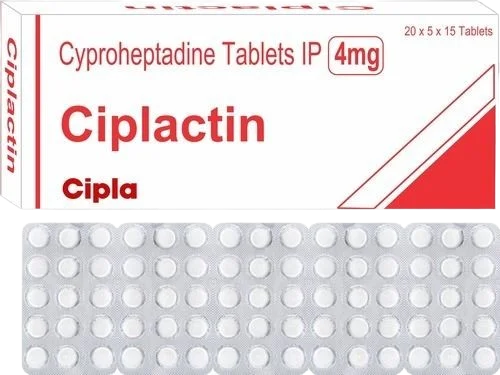It is helpful for itching and skin rashes caused by allergens. Its ability to block serotonin (5-HT receptors) distinguishes it from standard antihistamines. This feature contributes to its unique uses, such as appetite stimulation and migraine management. It provides quick relief from allergy symptoms and can stimulate appetite quickly. It is suitable and approved for adults and children (over 2 years old) with adjusted dosages. Its mild sedative properties can benefit patients experiencing discomfort or restlessness because of allergies. Beyond allergies and appetite stimulation, doctors use it in conditions like anorexia nervosa, cachexia, and weight gain therapy under medical supervision. It has a long safety record and has been there for decades, with a well-documented safety profile when taken as prescribed.
What is Ciplactin 4mg?
Ciplactin 4 mg (Cyproheptadine) works by blocking specific receptors in the body, resulting in its therapeutic effects.
Mechanism of Action
H1 Receptor Blockade (Antihistamine Effect)
Cyproheptadine acts as a competitive antagonist of H1 receptors, sites where histamine binds during an allergic reaction. As Cyproheptadine blocks these receptors, it prevents histamine from triggering symptoms like sneezing, itching, swelling, and rashes.
Serotonin Receptor Blockade (Appetite Stimulation & Migraine Relief)
Cyproheptadine also blocks serotonin (5-HT2A) receptors, a unique feature compared to many other antihistamines.
Appetite Stimulation
Serotonin is involved in suppressing appetite. By inhibiting serotonin, Ciplactin increases hunger and food intake.
Migraine Relief
Serotonin plays a role in causing migraines by promoting the constriction of blood vessels. Cyproheptadine reduces serotonin activity, preventing or lessening vascular headaches.
Mild Anticholinergic Action
Ciplactin also has a mild anticholinergic effect, reducing mucus secretions in the nose and throat, which helps manage cold-induced allergies.
Key Effects Based on Its Mechanism
Allergy Relief
Ciplactin prevents symptoms like runny nose, watery eyes, itching, and hives by stopping histamine activity.
Appetite Boost
Increases hunger by blocking appetite-suppressing effects of serotonin, making it helpful for underweight individuals or those with poor appetite.
Migraine Prevention
Ciplactin reduces the vascular effects of serotonin, helping to prevent or alleviate migraines.
Sedative Effect
Ciplactin acts on the central nervous system (CNS). It can cause drowsiness, which may benefit individuals with restlessness because of allergies.
Duration of Action
The effects of Ciplactin 4 mg typically begin within 1–2 hours after ingestion and last for about 4–6 hours, depending on your metabolism.
This multi-receptor activity makes Ciplactin a versatile medication, effective for managing allergies, stimulating appetite, and preventing migraines. Always use it as prescribed to achieve the desired results safely.
What are the Uses and Benefits of Ciplactin 4mg?
Ciplactin 4 mg (Cyproheptadine) is a versatile medication with several therapeutic uses and benefits.
Uses of Ciplactin 4 mg
Allergic Conditions
Relieves symptoms of allergies caused by histamine release, such as:
- Sneezing.
- Runny nose.
- Itchy, watery eyes.
- Skin conditions like urticaria (hives) and pruritus (itching).
- Cold-induced allergies.
Appetite Stimulation
Treats loss of appetite and helps in weight gain for
- People with poor nutritional intake.
- Conditions like anorexia nervosa or cachexia.
- Recovery from an illness where appetite has diminished.
Migraine and Vascular Headaches
Ciplactin prevents and relieves migraines by blocking serotonin’s role in blood vessel constriction.
Skin Conditions
Used for conditions like angioedema (swelling under the skin) and eczema, where itching is a leading symptom.
Anaphylaxis (Adjunct Therapy)
Used as an add-on treatment to adrenaline in severe allergic reactions.
Other Off-Label Uses
Doctors may prescribe it for irritable bowel syndrome (IBS) and some cold symptoms.
Benefits of Ciplactin 4 mg
Effective Allergy Relief
Ciplactin quickly relieves symptoms of both seasonal and year-round allergies.
Dual Action–Histamine and Serotonin Blockade
Ciplactin provides benefits beyond standard antihistamines by blocking serotonin, making it useful for migraines and appetite stimulation.
Appetite Stimulation and Weight Gain
Ciplactin is ideal for individuals struggling with poor appetite or underweight conditions. It helps improve nutritional intake, leading to better overall health.
Migraine Prevention
Ciplactin reduces the frequency and severity of migraines, improving the quality of life for patients with recurring headaches.
The sedative effect induces Resting.
Its mild sedative properties can help patients rest better during allergic discomfort or migraines.
Safe for a Wide Age Group
Doctors can prescribe it for children (above 2 years) and adults with appropriate dosing.
Cost-Effective
Ciplactin is more affordable than the newer medications with similar efficacy.
Rapid Onset of Action
Ciplactin works quickly, often within 1–2 hours of administration.
What are the Safe Dosages of Ciplactin 4mg?
The dosage of Ciplactin 4 mg (Cyproheptadine) depends on the patient’s age, medical condition, and response to treatment.
Standard Dosages for Ciplactin 4 mg
Adults
Typical Dose: 4 mg, taken 2–3 times daily
Maximum Dose: Up to 32 mg per day, divided into multiple doses (as prescribed by a doctor)
Children (7–14 Years)
Typical Dose: 4 mg, 2–3 times daily.
Maximum Dose: Do not exceed 16 mg per day.
Children (2–6 Years)
Typical Dose: 2 mg, 2–3 times daily.
Maximum Dose: Do not exceed 12 mg per day.
Infants (<2 Years)
Not Recommended: Medical science has not established the safety and efficacy in children under 2 years.
For Specific Conditions
Allergic Conditions
The dose varies depending on severity but follows the standard adult and pediatric dosages.
Appetite Stimulation
Typically, 4 mg once or twice daily, adjusted based on the patient’s response.
Migraine Prophylaxis
The starting dose is 4 mg, 2–3 times daily, or as a doctor adjusts it.
How to take Ciplactin 4mg?
Take the prescribed dose as your doctor advises, and typically take 2–3 times daily, depending on your condition. You can take it on an empty stomach or with meals to reduce stomach upset. Ensure even spacing between doses if taken multiple times daily (e.g., morning, afternoon, evening).
Swallow the tablet whole with a glass of water. Do not crush or chew the tablet unless instructed by your doctor. Drink plenty of water to stay hydrated, especially if you experience dry mouth (a common side effect).
For Allergy Relief
Take as soon as allergy symptoms occur or as your doctor directs for ongoing conditions like hay fever or hives.
For Appetite Stimulation
Take Ciplactin before meals to maximize appetite stimulation. Consult your doctor for the best time.
Migraine Prevention
Take at the same time(s) daily to prevent migraines, even if no symptoms are present.
Avoid Alcohol: Alcohol can enhance the sedative effect, leading to excessive drowsiness.
Operating Machinery or Driving
Ciplactin may cause drowsiness or dizziness; avoid activities requiring alertness until you know how it affects you.
Stay Consistent
Take the medication at the same time(s) every day for consistent effectiveness, especially for chronic conditions. Always follow the exact dosage and instructions given by your healthcare provider. If you have any side effects or concerns, consult your doctor immediately.
When Should I Avoid Ciplactin 4mg or use Ciplactin 4mg cautiously?
When to Avoid Ciplactin 4 mg?
Allergy to Cyproheptadine or Other Ingredients
Do not use it if you are allergic to Cyproheptadine or any inactive ingredients in the tablet.
Infants and Young Children (Under 2 Years)
Medical science has no evidence to establish the safety and efficacy in children below 2 years.
Narrow-Angle Glaucoma
It can increase intraocular pressure, worsening the condition.
Peptic Ulcers with Pyloric Obstruction
Ciplactin may aggravate symptoms because of its anticholinergic effects.
Enlarged Prostate (Benign Prostatic Hyperplasia)
It can cause difficulty in urination or worsen urinary retention.
Asthma or Respiratory Disorders
Avoid it during acute asthma attacks because its anticholinergic properties may thicken bronchial secretions.
Severe Liver Dysfunction
The body metabolizes Cyproheptadine in the liver; impaired liver function can increase the risk of side effects.
Pregnancy and Breastfeeding
You should avoid it unless a doctor prescribes it because of limited safety data.
Patients Taking Monoamine Oxidase Inhibitors (MAOIs)
Drug interactions may occur, leading to enhanced sedative effects or other complications.
Acute Angle-Closure Glaucoma Risk
Ciplactin can dilate pupils and worsen intraocular pressure.
When to Use Ciplactin 4 mg Cautiously?
Older Patients
It can have increased sensitivity to sedative and anticholinergic side effects (e.g., drowsiness, confusion, dry mouth).
Chronic Conditions
If you have conditions such as diabetes, hypertension, or heart disease, consult your doctor before use.
Concurrent Alcohol or CNS Depressants
Combining with alcohol, sedatives, or tranquilizers can enhance drowsiness and CNS depression.
Seizure Disorders
Use it cautiously, as antihistamines may lower the seizure threshold.
Occupational or Hazardous Activities
Avoid driving, operating machinery, or engaging in activities requiring mental alertness, as it may cause drowsiness.
Mild Liver or Kidney Dysfunction
Your doctor may adjust the dose because of altered metabolism or excretion.
What are the Side effects of Ciplactin 4mg?
Common Ciplactin 4mg Side Effects
- Drowsiness or Sedation
- Dry Mouth, Nose, or Throat
- Increased Appetite and Weight Gain
- Dizziness or Lightheadedness
- Nausea or Stomach Upset
- Constipation
- Blurred Vision
Severe Ciplactin 4mg Side Effects
- Severe Allergic Reaction (Anaphylaxis):
- Confusion or Severe Mental Changes:
- Heart-Related Issues:
- Urinary Retention:
- Seizures:
- Severe Dizziness or Fainting (Orthostatic Hypotension):
- Severe Blurred Vision





